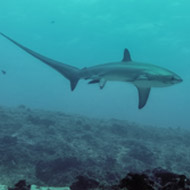
Little is known of the reproductive strategies of most oceanic species
A rare shark, observed in the waters of the Philippines, has been photographed giving birth to a pup for the first time.
Pelagic thresher sharks are classified as vulnerable to overexploitation by the International Union for Conservation of Nature. They have been rarely observed in the wild, and little is known of the reproductive strategies of most oceanic species.
During a biological survey of the Monad Shoal - a natural cleaning station for fish - lead researcher Dr Simon Oliver from the Univeristy of Chester and his team from the Thresher Shark Research and Conservation Project, observed a large female pelagic thresher shark swimming back and forth across the cleaning station in an agitated state.
They were unable to decipher the cause of the shark's distress from their observation post, although it was evident that cleaner wrasse (smaller fish which nibble away at the shark) were taking bites from the shark's pelvic region.
The shark was observed for a total of four minutes, during which the team took its photograph for identification purposes. It then left the cleaning area and was not observed again.
When the photograph was processed for analysis, it revealed the head of a pup emerging from the shark's cloaca.
Speaking to MRCVS, Dr Simon Oliver said: "Having studied these animals for years it was the second most exciting moment of my career.
"Although we cannot know for certain, it may very well be the first record of an oceanic shark species giving birth in the wild. This was a remarkable moment and we were very privileged to observe it."
The image has been published in the journal, Coral Reefs.
Image (C) Atilla E Bicskos



 The BSAVA has opened submissions for the BSAVA Clinical Research Abstracts 2026.
The BSAVA has opened submissions for the BSAVA Clinical Research Abstracts 2026.